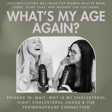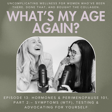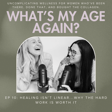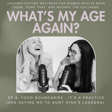Become a Creator today!Start creating today - Share your story with the world!
Start for free
00:00:00
00:00:01

Ep. 15: WTO - What the Oil? The Info You Need to Calm Inflammation and Support Your Hormones
Feeling overwhelmed by all the oil talk out there? You’re not alone. We’re here to cut through the noise and simplify it, so you know exactly how to choose oils that support your health, reduce inflammation, and make your meals both nourishing and delicious.
What You’ll Learn in This Episode
- Why it’s not about demonizing oils (you’ve heard about the dreaded seed oil) but understanding how they affect your body.
- The difference between “inflammatory” vs. “anti-inflammatory” oils.
- How omega-3s and omega-6s work in your body — and why your balance may be off.
- Why this ratio matters even more during perimenopause (hello, joint pain, brain fog, and mood swings).
- The truth about refined, unrefined, cold-pressed, and hydrogenated oils.
- What trans fats really are and how they impact your health.
- The real story on seed oils — and how to navigate them without panic.
- Everyday foods where seed oils sneak in (and why labels matter).
- The best oils to cook with vs. the best ones to drizzle and finish with.
- Easy swaps and small steps to lower inflammation — starting with something as simple as making your own salad dressing.
Where to find us:
Or email us at: wmaapod@gmail.com
Where to find Tanya:
IG @tlcholistic
FB @tlcholistic
Book with Tanya: https://tlcholistic.janeapp.com/locations/tlc-holistic
Join the TLC Community: https://www.patreon.com/tlcholistic
Where to find Kim:
Book with Kim: Complimentary Connect Call
Transcript
Podcast Introduction
00:00:00
Speaker
Welcome to What's My Age Again, the realest podcast for women who are done chasing trends and ready to feel empowered. Hi, I'm Kim. And I'm Tanya, holistic nutritionists and childhood best friends who've been there, done that, and bought the collagen.
00:00:16
Speaker
more than once. Each week we provide actionable steps that you can start today to help you thrive through every decade to come. We're
Mission and Approach
00:00:24
Speaker
cutting through the wellness noise to bring you honest conversations about aging, hormones, health, beauty, mindset, and everything in between.
00:00:33
Speaker
You see, we're also on a mission to age gracefully one WTF moment at a time. Backed by research and real life, we're here to share what actually works, what's a waste of time, and how to truly thrive through the messy, magical midlife transition.
00:00:49
Speaker
We're so happy you're here. Let's dive in. Welcome back to What's My Age again. hi Tanya. Hey, Kim. How are you? and I'm good. How are you? We are well into September.
00:01:03
Speaker
That we are. Time is flying.
Understanding Oils: A Common Question
00:01:07
Speaker
Well, we're going to get right into things today because both Tanya and I, before when we were planning this episode, we were thinking about some of the biggest, the most frequent questions that we get in our practice with our clients online.
00:01:22
Speaker
And a question we're constantly getting is what oils should I use? What oils should I use for cooking? Are seed oils bad? What are anti-inflammatory oils? What are inflammatory oils? What are bad and good?
00:01:38
Speaker
And so we wanted to kind of dig into this today. Absolutely. And this is a super big cut through the noise episode because I'm not going to lie, even as a nutritionist,
00:01:51
Speaker
I used to get confused over this topic because there's just so much darn information out there. One website says this, one health guru says that, your doctor might say this. So this is a space where we're going to literally talk about all of these things and give you a concise 30 minute nutshell version so you can leave feeling confident and comfortable about the oils that you're choosing and consuming.
00:02:17
Speaker
Love that. Absolutely, Tanya. So why don't you set the stage for us? Let's talk either good oils and bad oils. And yeah, and I know we always say good oils and bad oils, but I think for the purpose of this podcast, like me and you have talked about So many times before, we're going to take off the good and bad oils for the most part, because there are some
Seed Oils and Misconceptions
00:02:40
Speaker
bad ones. But let's talk in the first and foremost about the seed oils, because I think those are all the rage right now.
00:02:48
Speaker
So if we hear the term seed oil, I think we've all been conditioned to say that is a bad oil. That is inflammatory, right? That is an inflammatory oil. And that that part's not incorrect, but we can't demonize oils. So we're going to learn to understand the effects they have on the body. So first and foremost, inflammatory oil versus an anti-inflammatory oil, but how the body actually needs both, but we need the proper balance.
00:03:21
Speaker
Right? And that is where the problem is, is we're not getting the proper balance. So therefore, these inflammatory oils are all written off as bad and terrible oils. And we're all petrified of them.
00:03:35
Speaker
Exactly, Tanya. That's a real problem. It's a really
Omega Balance and Health Impact
00:03:38
Speaker
great point. And so when you're talking about the balance, if we can get in there for a second, what Tanya and I are saying is, for all of you out there, you may have heard the term omega-3s.
00:03:50
Speaker
have you heard And we'll talk about that a little bit more in a second, but like we may have all heard about this. It's important to have our omega-3 oils. It's anti-inflammatory. There's also omega-6 right?
00:04:03
Speaker
oils And this is where we get into those seed oils because a lot of the seed oils, like a canola oil, like a so safflower oil, they contain a lot of those omega-6s, which aren't bad in general. But when, as Tanya mentioned, our ratio is off, we have more of the omega-6s in our diet than the omega-3s in our diet.
00:04:27
Speaker
That is when our ratio is off and it can cause an inflammatory effect in our bodies. And if you guys could see Kim, I love it. She did her scale hands. The balance is off.
00:04:39
Speaker
And you guys want to know how wild, crazy the balance is off. So the ideal ratio of omega three to six um is in and around an average of two to one. Okay.
00:04:52
Speaker
Meaning that our diet should provide twice the amount of six to three. which is sometimes confusing for people because they're like, whoa, isn't six the inflammatory one? It is. And we're not going to get into what inflammatory prostaglandins do. It doesn't matter.
00:05:07
Speaker
So think about that ratio being two to one. But you guys want to know the estimated current average ratio now is between 10 to 1 and 20 to 1 in the typical North American diet.
00:05:23
Speaker
So now it becomes a problem when you think 20 units of inflammatory oils versus one of omega-3 anti-inflammatory, we can kind of see where the issue lies.
00:05:35
Speaker
And where does this come from?
Omega-6 in Processed Foods
00:05:36
Speaker
This comes from the amount of processed food. When we're going to eat out the the types of oil they're using to cook our food, our fried food, take a look at the ingredients in what we're we're purchasing off the shelves. Most of the time, it's canola oil, it's saffron oil, all of those omega-6 heavy oils.
00:05:56
Speaker
Even, it's so funny, I had a client sent me a picture of Hellman's mayonnaise that said, made with olive oil. And I said, you know, turn it around to the back. The first ingredient was actually canola oil. Yeah.
00:06:09
Speaker
I mean, they're probably like Hellman's, not your client. To be fair, there's olive oil inside. And we're like, yeah, rather there are oils as well.
00:06:19
Speaker
And here's another one, Kim, actually, if we're talking about examples. I had a client, this was like maybe a year ago back. Did you know that PC Organics, which I am a fan of a lot of their things, but they're dried organic cranberries. This was for a Christmas baking recipe.
00:06:35
Speaker
um Albeit they have no sugar, which is amazing. That's what we look for. They have canola oil in them. Isn't that wild? So yeah, that's what we're trying to say is that these omega-6s are sneaky-deaky into everything that we're eating, processed, and even the things we might not think of, like the mayo, like the cranberries...
00:06:57
Speaker
And I think we should talk about why this is so important now before we move on, you know, further. And why,
Menopause and Inflammation
00:07:06
Speaker
Kim, would you say it's so important now as women in a certain age group as we age?
00:07:12
Speaker
Well, its it's so important, especially because so many of you, we know the audience that we attract, likely you are going through perimenopause. um Likely, yes. So,
00:07:25
Speaker
When it comes to our hormones, for example, like estrogen, which naturally keeps our inflammation in check in our body, as estrogen starts to decline, inflammation becomes higher.
00:07:37
Speaker
So we need to be even more diligent about looking to our diet to keep that inflammation in check. Exactly. So we have so many hormonal factors, again, perimenopause, menopause, postmenopause, where we're already dealing with inflammation. So this is, again, a tangible thing that we can have control of, of...
00:08:02
Speaker
switching the balance. So it's just not another thing stacked against us for an inflammatory process in the body. absolutely So I think, yeah. So think of things I was just going to say symptoms too. So people can keep in mind like what that inflammation, what happens in our body? How does it appear?
00:08:18
Speaker
Symptoms like joint pain as estrogen declines, inflammation can increase joint pain, mood swings, brain fog, um, in in even long-term risks like heart disease, osteoporosis.
00:08:34
Speaker
A thousand percent too. And even changes in our skin when we're seeing things like rosacea, you know, these inflammatory conditions that we're more prone to as we age. So I think what we're trying to drive home here is that when we're talking about seed oils, I don't think we can say that these are bad oils and demonize them, What we have to do is take back our power, come from a place of power and not fear.
00:09:01
Speaker
We're not scared necessarily of the omega-6 containing oil. What we need to be more concerned about is how much of it we are allowing into our diets and keep that ratio in check, right? Absolutely.
00:09:17
Speaker
And as I said this, I'm saying that there's no bad oils, but oils are different. Oils can be um processed differently. They are made up of different molecules. So I think maybe a brief, but like simple chemistry lesson might drive more understanding to that point. And I mean, Kim is definitely my famous my favorite chemist. So but we'll see about that. Yeah.
00:09:44
Speaker
And you know what, you're absolutely right, Tanya. I think before we dig into more details in oil and let's let's go back to the basics here. So quick chemistry lesson.
00:09:56
Speaker
Okay. So oils or fatty acids essentially... are
Fats and Their Structures
00:10:02
Speaker
chains of carbon and hydrogen atoms, and they consist of links. So they can be short, they can be medium or long. You may have heard of short chain fatty acids or medium chain fatty acids, like an MCT oil, for example.
00:10:14
Speaker
But another big and important characteristic of fats or fatty acids are where whether they are saturated or unsaturated. And I'm sure all of you have heard of the saturated fats versus unsaturated fats.
00:10:29
Speaker
But from a chemistry perspective, what happens is each of these carbons are connected by hydrogen atoms and surrounded by hydrogen molecules. So if you think of a sponge, for example,
00:10:43
Speaker
um The fatty acid is holding all of the hydrogens. All the hydrogens are there. It's full. It is saturated. It's saturated with hydrogen molecules, right? Exactly.
00:10:55
Speaker
Exactly. It's a saturated fat. All the hydrogens are there. And this makes the fat stable. It makes the fat ah much more stable to our environment. And also what what that saturated fat does in the body is it creates are cellular structures that are stable.
00:11:15
Speaker
So if you think of that sponge again, that um these fats are typically solid at room temperature. So a stable... fat is a sponge proverbial, that's the analogy here. I love it.
00:11:29
Speaker
That is full of water. So it is saturated exactly. So like a coconut oil. exactly So an MCT oil is different because it's liquid at room temperature, a coconut oil, a butter, these are saturated fat, an animal fat, a chicken, you know, that the fat collageulates when it cools down. These are saturated sponges full of hydrogen. Correct? Absolutely. And like I said,
00:11:50
Speaker
but they're They're also great in our bodies for that stability of our cell walls. So I know so many people have thought of saturated fats being the big demon, labba the bad saturated fats, and then we need to reduce them for our diet, but they actually are really an important part of our diet.
00:12:10
Speaker
Right. And I think it goes to say that all saturated fats are not created equal, right? Nothing's created equal. So saturated fats aren't created equal. And we can say with the proper balance, just like we were talking about the omega-3s and 6s. So same thing with the proper balance of saturated fats.
00:12:29
Speaker
These are health protective fats. Absolutely. And there's actually a great book, Tanya, and I know we're going to dive deeper into this, I think in next week's episode, but there's a great ah book. It's called The Big Fat Surprise, and it dives into where this whole low fat craze, what happened with low fat, the demonizing of the saturated fat, how that changed, you know,
00:12:53
Speaker
us from eating fats, like for example, our eggs for breakfast to our bagels for breakfast and that decrease in fat and that increase. It's, it's a great book. Anyways, we'll dive deeper into that next week, but yeah, and definitely we'll put that book in the show notes. so thank you. That's such a good on analogy for saturated fat, that saturated sponge. So now let's talk about, if you don't mind unsaturated fats.
00:13:17
Speaker
Absolutely. So the same way, um When we go back to those hydrogen atoms, what happens with unsaturated fats is that they're missing a hydrogen, might be one or more. And the more they're missing, the more unstable or unsaturated they become.
00:13:34
Speaker
So for example, a flax oil is highly unstable, which is why we need to keep it in the fridge. um It's liquid at room temperature, like we discussed earlier. And yeah, it's more delicate and yeah, not as as stable.
00:13:49
Speaker
And that makes sense. Again, if
Cooking Oils and Stability
00:13:51
Speaker
we go back to the layman's term, a saturated sponge full of water is a lot harder. You know what I mean? Let's say to move, knock off the shelf lift than an empty dry sponges on the side of the counter. Right.
00:14:02
Speaker
Absolutely. Yeah. So I, those are such good analogies. Thank you for that. Like mini chem lesson. So I think that this becomes really important when it talks, when we talk about the confusion surrounding using oils. Right.
00:14:19
Speaker
Like, I know you you get that question all the time and I get that question all the time and I still get that question almost 10 years into my practice. There's still so much confusion about what are we cooking with?
00:14:32
Speaker
What are we not cooking with? How are we storing these oils? What do we need to protect them from? So, I mean, I think that this would be a really good time to talk about oils in the kitchen.
00:14:42
Speaker
Absolutely. And we get that. Yeah. Like you, Tanya, I get that question all the time. And so when you think about it if you go back to that sponge again, the saturated fats, they are the most stable. So they are the most stable against things like heat, light, and oxygen.
00:14:58
Speaker
So these are the fats that are fantastic for cooking, cooking at high heat. So like you said, your butter, your ghee, your coconut oil, those are all fantastic for cooking at high heat.
00:15:11
Speaker
And while we talk about high heat cooking, even though we're not going to go that deep into the chemistry lesson in terms of polyunsaturated and monounsaturated, it's important to say that avocado oil, although not considered a saturated fat, Definitely, everybody take note, put it on your list.
00:15:30
Speaker
Yes, that is also a beautiful oil for a high heat cooking because it has a high smoke point and it is stable with high heat. yeah It still needs to be protected.
00:15:44
Speaker
But let's just leave it at that for the purpose of this podcast. So those saturated fats and avocado oil. There's always an anomaly, right? It can never be straightforward to that extreme. right? There's always that one.
00:15:56
Speaker
You love avocado oil. Yeah. And think of that avocado oil as like the eccentric, like person at the party. You know what I mean? Like they're just there. They might not feel like they fit in, but they fit in beautifully. So and those are our cooking oils.
00:16:10
Speaker
um So what would you say then when we're talking about unsaturated, um our finishing oils, our dressing oils, like where are we going with those? What are your faves? Absolutely. So Obviously you can use that avocado oil anywhere, but extra virgin olive oil is when you want to use for your salad dressings.
00:16:29
Speaker
It's when you want to drizzle on things, as you mentioned. um Again, Tanya mentioned, we're not going to go into monosaturated versus polyunsaturated fats, but the stability of something like, for example, a flax oil, it's highly unstable, very delicate, rich in nutrients, needs to be kept in the fridge.
00:16:49
Speaker
should be kept. So take a step back here for a second. Those unsaturated fats are more unstable in general. So there're they're sensitive to things like heat. We talked about high heat cooking.
00:17:03
Speaker
They're sensitive to light and oxygen. So when you're purchasing those oils, it's really important to purchase in a darker bottle because it's protecting it from the light. It's protecting it from the light because it can be denatured by the light.
00:17:18
Speaker
um And a glass bottle as well. So when you're purchasing that avocado or sorry, the olive oil, you want it to be in a darker container. Exactly. Protected from heat, protected from light. And I think something I just want to add to this is um one of the books that changed my perspective, and it is very technical, so I'm not suggesting everybody needs to go out and read it, is Fats That Heal, Fats That Kill. And I know you've read it too, Kim, and you're very familiar with it because it's something we had to do during schooling. And the basic premise of this
00:17:50
Speaker
is fats that heal, like the ones you just mentioned, the extra virgin olive oil, the flax oil, the hemp oil, whatever we're talking about here, when they are not stored properly, or when they are used improperly, like you're going to a high temperature like stir fry with a flax oil, you are actually changing those molecules, referring back to Kim's chemistry lesson, maybe she'll, you can shed,
00:18:16
Speaker
shed some light on that in a second.
Proper Oil Storage
00:18:18
Speaker
And we're taking this oil and we are turning it into a fat that kills. And that's the title. So if we're not, we don't have the knowledge of where and how to use and store these oils. We think we might be doing a great thing by stir frying with our hemp oil.
00:18:34
Speaker
We are not. We are absolutely not. We're changing the molecular chemistry and they're now becoming inflammatory and dangerous to the body. Absolutely. so So things that will denature would be heat, as Tanya mentioned. So using those unsaturated oils, not using them for high heat cooking is really, really important.
00:18:56
Speaker
And also, like we said, the light. So keeping that to a darker bottle, and then oxygen. You don't wanna be leaving the top off your bottle of olive oil. You wanna make sure that you're closing it and protecting it from the amount of oxygen it's getting. So the other really important part is where is your oils? Where do you place your oils?
00:19:17
Speaker
I'm going to be honest, before I read that book, Tanya, mine were directly next to my oven. So although I wasn't using it for high heat cooking, the olive oil was sitting right next to my oven, heating up every single time I turned it on or turned on my stove.
00:19:33
Speaker
I'm going to be honest with you. Before I read that book, my vegetable oil in a clear plastic container was above my stove, continuously heating up and I used it for everything. But, you know, we learn, we live and we learn and we share our knowledge. So here we are. So, so important as well. And can we also talk about, um so now we know where to use these oils yeah and we know the characteristics to look for in terms of the packaging, but like I think it's important to talk about two methods of pressing oils, cold pressed oils, refined, unrefined, hydrogenization, like yeah hydrogenization.
Oil Terminology Explained
00:20:08
Speaker
I'm sorry.
00:20:09
Speaker
Let's go there now. I think that's an important part of purchasing and understanding what you're buying. Absolutely. So what Tanya is talking about is these are labels that will be written in the ingredients on your oil or will be on the front. You you may have seen unrefined coconut oil or refined olive oil or, and you've seen these terms.
00:20:28
Speaker
So let's dig into that now so that we can kind of clarify what they are. So first, maybe we can talk about the words like modified or hydrogenated, because this is where those bad oils, we can use the term bad oils.
00:20:44
Speaker
Absolutely. Okay. So back to the chemistry lesson quickly for a second. Hopefully you guys haven't turned it off. my first chemistry lesson. But so what happens is the food industry, what do they want? They want their oils to be more shelf stable, right? And so we talked about those um unsaturated fats and oils are more unstable.
00:21:08
Speaker
So they don't last on our shelf very long. So what they do, the food industry does to increase that shelf stability, to increase profits, is they add hydrogen to it.
00:21:20
Speaker
So if you think about it from the very beginning, we talked about those carbon chains. Some of the hydrogens are missing. That's what makes it unsaturated. So literally what the industry does is they put a vat of hydrogen underneath the oil and the hydrogens bubble up into the oil, and it literally changes the chemical structure of the oils.
00:21:41
Speaker
It adds the hydrogen where hydrogen wasn't before, and so it changes the molecular structure of that oil and makes it more stable. And even though that's a plus for the food industry, because now their three-month shelf life is a nine-month shelf life, guess what?
00:21:58
Speaker
It's not good for you because your healing fat has just become one that is detrimental. right And our body doesn't recognize it. No. but chain No chemical structure.
00:22:08
Speaker
Yeah. And it becomes inflammatory. Absolutely. So what we're saying here, long and short of it is anything that you see that has been hydrogenated, I don't care.
00:22:21
Speaker
Modified, hydrogenated, don't buy it. You're probably going to get it when you, you know, maybe stop and get a croissant or, you know, treat yourself or something. It's going to be in there. So if you're buying something with that on its label.
00:22:32
Speaker
No, please don't cut it out. Absolutely. Another, yeah another label you'll see is refined. And what refined means on the label is that these, these oils are highly processed.
00:22:46
Speaker
So for example, after the oil is extracted from whatever it is they're extracting it from, um maybe canola, um, um Then that oil is heated, it's filtered, it's bleached, it's deodorized to make it more shelf stable. So it basically, as Tanya said before, it denatures that oil and it kills the nutrients.
00:23:08
Speaker
They are highly, highly inflammatory. So I would not purchase anything with that term refined. Absolutely. um All of those words that you use down appetizing, bleaching and deodorizing in our food. So you guys can guess then the opposite of refined is obviously unrefined.
00:23:27
Speaker
And these oils have not been processed. And when you see unrefined, I'm not going to say that's your beacon, like, oh, that's great. Don't look at anything else.
00:23:37
Speaker
Can definitely throw you for a loop. But you're looking for that term to be part of the profile of the oil that you're going to buy. Unrefined is just that. It's an unrefined pure oil.
00:23:49
Speaker
Perfect. and and And another label you might see is cold pressed. So this is just referring to how the process of pulling the oil. And so these oils, for example, are extracted by pressing them, cold pressing them without using heat, which as we discussed, denatures that oil.
00:24:11
Speaker
So I guess the temperature doesn't go above 120 degrees. So that nutrients in that oil are not destroyed. So cold pressed is a good positive label. So yeah, at the end of the day, you want to be looking for oils that are cold pressed. If you find first cold pressed, that's even better. um That just means that there's just, that's the initial pressing of the seed that they're extracting it from, like from the olive, you know, um but cold press, first cold pressed, unrefined.
00:24:40
Speaker
This is what you're looking for. Again, to go back, what Kim said, dark glass, amber bottles. So now you have all of your bases covered. And Kim, will I never not think of you now?
00:24:51
Speaker
That's my bad habit. I will open the gosh darn olive oil. I will literally use it for something. And I will then leave it open while I cook my dinner and be like, shit, now I have got all this oxygen in my oil. So you are going to be on my brain. That's one of my bad habits. But if we can look for bottles like this and follow those rules, that's going to be, you know, very easy to remember in terms of storing and the kinds of oils that you want to pick.
00:25:18
Speaker
Absolutely. And I think the other term is organic. As we talk about in most episodes, if you can get something that's organic, that's just another label that you want to look for in um when you're buying oils as well.
00:25:31
Speaker
So maybe Tanya, this is a good part time to kind of go back to that concept of seed oils. We talked about omega threes and sixes. Let's maybe like clarify for people how they can get, how how can we change that ratio in our day to day?
00:25:53
Speaker
that's a good Yeah, I think that's a really good way to end this podcast is to offer a little bit of advice to remember that we can't dread the seed oil because it is an umbrella turn term of oils that are made of seeds and they're going to slip in our diet. But we don't want a 20 to 1 or, you know, 10 to 1 ratio. We want to get closer to that 2 to 1 ratio. So...
00:26:15
Speaker
ratio so What can we do? Well, first and foremost, get those scale hands out, balance the ratio, add more omega three to your day to balance your six intake.
Balancing Omega Intake
00:26:29
Speaker
So what does that mean?
00:26:31
Speaker
Let's pretend that you're going to a restaurant and you're eating, you know, something that works for you, that feels good for you. I'm going to say still 99% of the time, there's going to be some sort of seed oil that's slipped into that.
00:26:43
Speaker
Hmm. So you're already going to have that higher ratio right now of omega six to three. So what are things, Kim, that you would suggest? I say balance the ratio. What does that mean? What are you adding to balance the ratio to your day to day?
00:26:56
Speaker
Okay. Well, let's talk about what we we haven't even gone there of like, what contains omega three? So that's a great, yeah, we have it. you right.
00:27:07
Speaker
One of the biggest is what we talked about before those, that flax oil that has a great ratio of omega three to six oil. Flax contains a ton of omega threes, high in omega threes. Another, we talked about, um, oils found in animals.
00:27:23
Speaker
Um, cold water fish contains a ton of omega threes. So cold water fish, like wild salmon, um, mackerel, high amounts of omega-3. Another one is our chia seeds, walnuts, hemp hearts contains a great balance of omega-3s to 6s. So adding those foods to your diet on a day-to-day basis will increase the amount of omega-3s so that when you go out and have the omega-6s, that balance, that scale um is more balanced.
00:27:58
Speaker
A thousand percent. And also to note too, exactly. You can have your flax oil, your hemp oil, but also just having your freshly ground flax seed, your hemp seeds that aren't even oils, using them as how I like to say super sprinklers on everything that is adding omega-3 to your diet.
00:28:15
Speaker
And also to note too, even if you're not going out, chances are, even if you're using things that are processed in your house and even healthier process. We talked about, you know, a little bit while, ah a little while back about snap, making your kids lunches and like even the healthier versions of stuff we're not making can have a little bit of sunflower or a little bit of canola in there, even if we're not eating out.
00:28:38
Speaker
just shoot for that higher omega-3. And another way we can do that is simply what we said before, cut out the super damaging ones, okay? Don't buy anything hydrogenated. Don't buy anything genetically modified.
00:28:51
Speaker
That's a good way to know that you're cutting out these oils right at the source. Absolutely, Tanya. And I think for me personally, what sort of my rule is always like what I control what I have in this house, right? I can control, I control what we eat on a regular basis. And that is the majority of our diet.
00:29:09
Speaker
And if we're looking and eating those, those shelf, those oils that we just talked about, we're increasing the amount of omega-3 in our diet. Then if we have some processed food or if we go out for dinner, we don't have to worry about it.
00:29:24
Speaker
Yeah, because we're keeping that scale intact. And also just being mindful of the seed oils that we're buying. You know, all of the things we just said, take that to heart. And we're looking for oils more rich in omega-3 and 6. Not because the 6 is bad, just because it's going to sneak in anyways. And I'm sorry, but this reminds me of a story where earlier in the year, i was visiting you. And I was at your house alone during the day.
00:29:51
Speaker
just because of plans or whatever. So I wanted a snack. So yeah I rifle through Kim's pantry and I look up and I see a beautiful brand that I buy, like the brand name, um in a dark glass bottle, organic, first cold press, canola oil. And right away, I wasn't like, oh my God, Kim has canola oil. I was like, oh my God, what am I missing?
00:30:12
Speaker
What is Kim using the canola oil for? Because if it's in her pantry, like... I know it's good. And I know like, what am I missing? And I started to doubt myself on, you know, the canola oil. So anyways, gets home and I literally took out of the cupboard and I was like, why do you have canola oil?
00:30:29
Speaker
And we had a really good laugh. It was actually, um, her husband. bero hadba i thought it think when you sell oil or Yeah. They come back, thought it was olive oil because it's a, the, the bottles are so similar, but it's interesting because And I went right to Kim, like, what are you using this for? And you were very adamant to let me know.
00:30:51
Speaker
Obviously, we all go have those things in the pantries that are messes up and we don't know what to do with them. So they sit there, but it's, you know, it's not a bad oil, but it's not an oil that you use because those little sneak ins come in anyways. So I'm sure that's still sitting in there till the end of time. oh I know. I've got it. Yeah, probably. Probably if I went in there, it's probably still there. I got to get rid of it, but it's true. next Yeah.
00:31:14
Speaker
It's true. It's not exactly. i think what you just said is perfect. Like we can control what we're consuming in our home. And so why add to, why add the omega, like why add that canola oil when we're going to get it sneakily elsewhere later?
00:31:31
Speaker
So, and I think, you know what, just Tanya, that made me think of one more thing. I think one small thing that all of you could do is make your own salad dressing.
Homemade Dressings and Omega-6
00:31:43
Speaker
Make your own salad dressing. Because if you look at the back of every salad dressing on the, that's out there, guaranteed there's, there is safari oil, canola oil, one of those oils that in them And so if you make your own salad dressing with a beautiful flax oil, with your beautiful olive oil at home, it's an easy way to, yeah, increase those good oils, those anti-inflammatory oils in your diet.
00:32:11
Speaker
I couldn't agree more. i love this. So two things before we go. If you guys want some of our favorite salad dressings, send us a DM, comment on the podcast. Cause I'm not going to lie. Me and Kim thought we were so technologically genius a couple episodes, a couple months actually back.
00:32:31
Speaker
um And we linked our recipes for our eating for the season. They didn't work. Spoiler alert. They did not work. So. We had to send them to you by email.
00:32:44
Speaker
So reach out if you want salad dressing in the show notes, you will find our email that works. I promise you. yeah And the last thing I want to say too, is absolutely anytime I thought I was buying a good salad dressing, there was always sneaky deaky Omega six oils in there.
00:33:02
Speaker
But I will say one brand, if you're in a pinch is the mother raw. They are organic and they use only cold pressed olive oil.
00:33:12
Speaker
So if you're in a pinch, that's a really good dressing that you can grab on hand. Otherwise, make your own. takes two seconds. it takes two seconds. Love it. i Love it, Tanya. Well, i hope I hope that this sort of helped cut through the noise as Tanya, that was our whole point of this podcast Again, always reach out if you have questions after this. Hopefully we clarified it and didn't make things more confusing for you.
00:33:39
Speaker
um But yeah, reach out if you have any questions. And yeah, Tanya, it's always, it's been a great, it's been a pleasure chatting today. but it has been a delight. Thank you for that chemistry lesson. And honestly, the sponge was such a good analogy. So guys, I think we gave you a lot of knowledge. If you have questions, reach out and we will see you next week.
00:33:59
Speaker
See you next week. Bye, everyone. Hey, guys. Thanks so much for hanging out with us today. If this episode resonated with you, we would love it if you would hit like, subscribe to the podcast, and share it with a friend.
00:34:13
Speaker
We love to hear from you because let's be honest, this show is for you. If you have a topic you'd love us to tackle or want to learn more about something we talked about today, send us a message. We got you.
00:34:25
Speaker
Stay connected with us on social media at what'smyageagain.podcast for even more knowledge and inspiration between episodes. Kim and I aren't doctors or your healthcare practitioners.
00:34:38
Speaker
Everyone's body is unique, so always consult your own healthcare care provider before starting something new.



















